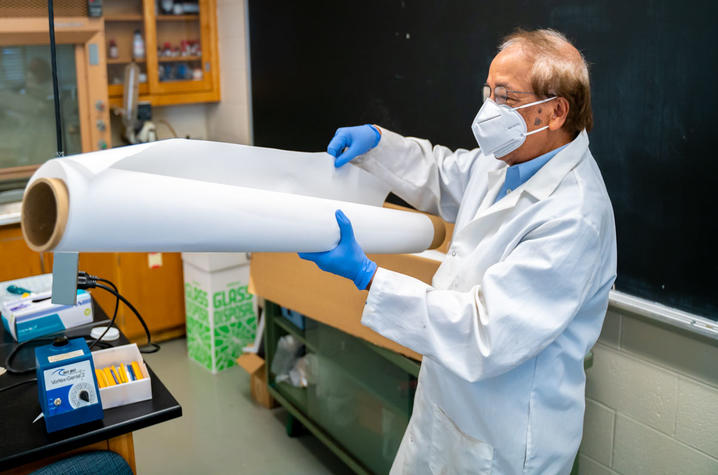UK Gets NSF Funding to Develop Face Mask that Can Deactivate COVID-19
LEXINGTON, Ky. (May 14, 2020) — University of Kentucky engineering professor Dibakar Bhattacharyya recently announced he had the concept and the means to develop a medical face mask that would capture and deactivate COVID-19 on contact. Now, the director of UK’s Center of Membrane Sciences, along with collaborators from two different disciplines, has received a grant from the National Science Foundation (NSF) to make these masks a reality.
Bhattacharyya, known to friends and colleagues as “DB,” secured support through a Rapid Response Research (RAPID) grant from the NSF, which has called for immediate proposals that have potential to address the spread of COVID-19. The grant provides $150,000 over one year.
DB will serve as the principal investigator (PI) and engineering faculty members J. Todd Hastings and Thomas Dziubla, as well as Yinan Wei from the UK Department of Chemistry, will contribute as Co-PIs.
For the RAPID project, the team will create a membrane mask and other flat sheet materials with a more porous and spongy structure that will include charged domain and enzymes, which would capture and effectively deactivate SARS-CoV-2, the virus that causes COVID-19.
DB says the novel coronavirus is covered in club-shaped “s-protein” spikes, which give it its crownlike, or coronal, appearance. The protein spikes are also what allows the virus to enter host cells once in the body. This new membrane will include proteolytic enzymes that will attach to the protein spikes of the coronavirus and separate them, killing the virus.
“We have the capability to create a membrane that would not only effectively filter out the novel coronavirus like the N95 mask does, but deactivate the virus completely,” said DB. “This innovation would further slow and even prevent the virus from spreading. It would also have future applications to protect against a number of human pathogenic viruses.”
The new membrane will build upon the center’s National Institute of Environmental Health Sciences (NIEHS) and NSF-funded activities, which have developed various functionalized membranes for environmental remediation. In contrast to passive membranes, functionalized membranes provide additional benefits by interacting with undesired particles like viruses through selective binding or deactivation.
He says the process would take around six months to create the finished and tested product. The work will then be facilitated through existing collaboration with a large-scale membrane manufacturer.
DB says the research team’s collaboration across disciplines is a testament to the innovative and collaborative spirit of the university, as well as its service-centered mission.
“At the University of Kentucky, we have great resources at our fingertips and many opportunities to engage in cutting-edge research across disciplines,” DB said. “Our researchers work together and lend their expertise to solve challenges for the greater good of humanity, not only at a time like this, but every day.”
Those interested in learning more about DB’s research are welcome to attend a live webinar via Zoom on Friday, May 15 at 12:30 p.m. EDT. During the webinar titled, “Functionalized Membranes: Water Detoxification to Mask Development,” DB will discuss how surface functionalization of membranes allow degradation or capture of toxic pollutants beyond reverse osmosis, and extension to membrane media mask for potential coronavirus deactivation. Attendees must register in advance here.

As the state’s flagship, land-grant institution, the University of Kentucky exists to advance the Commonwealth. We do that by preparing the next generation of leaders — placing students at the heart of everything we do — and transforming the lives of Kentuckians through education, research and creative work, service and health care. We pride ourselves on being a catalyst for breakthroughs and a force for healing, a place where ingenuity unfolds. It's all made possible by our people — visionaries, disruptors and pioneers — who make up 200 academic programs, a $476.5 million research and development enterprise and a world-class medical center, all on one campus.




